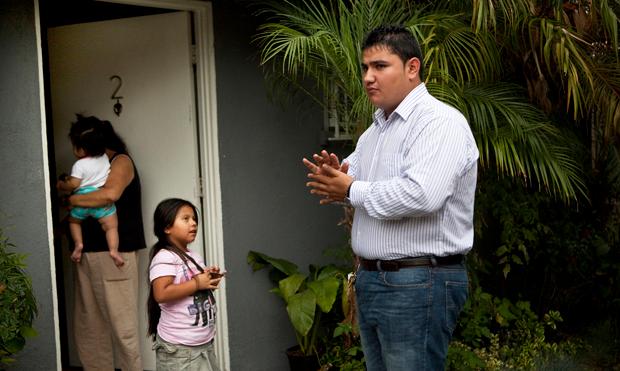Arriving Young and Alone: One Guatemalan Migrant’s Trek
Los Angeles, CA: July 12, 2012 – Ronald Aldana stands near the front door of his home. His girlfriend’s mother, Julia, and family friends hang out, watching Ronald cook on the grill, in the front yard.
For years, war and poverty were the main reasons that young people from Mexico and Central America headed to the United States. But in recent years, it is gang violence that’s causing more and more youngsters to make their way north.
Death threats from the maras – or gangs – in his native Guatemala are the reason Ronald Aldana said he left. The son of farmers from the rural Santa Ana region said it started when he was 16-years-old. He was studying auto mechanics at a trade school when he heard that his cousin was murdered alongside a road. Aldana and his dad reported the crime to the police and helped with his burial. Within hours, Aldana started getting threats that escalated into attacks.
“We just couldn’t deal with it anymore,” Aldana said. “The first time they tried to kill me, I’d gone out to pick up some books and as I headed home, a group of men on the street started shooting in my direction, but I jumped towards a ravine behind me.”
Aldana survived the attempts on his life. But his father decided it was time for him to leave – for good. Aldana said, “[My father] hugged me and said, ‘Son, you know I love you, but you cannot stay here. I’d rather die than have you killed.'”
Aldana resisted. But he was familiar with this kind of story, and he knew how it was likely to end: If the gangs target you – you’d better go. His older sister, who’d migrated to Los Angeles years back, said she’d pay the $5,000 smuggler’s fee. Within a day, Aldana started his trek. Once in Mexico, he met other Central American migrants. They walked more and boarded long-distance buses.
“It took us a little more than two days to cross Mexico, too, because there was a lot of police around, and also the Zetas, which are notorious for targeting migrants,” Aldana said. “I don’t know if it’s true, because they didn’t harm us, but that’s what the coyote would tell us.”
Once on the American side, Aldana walked along a freeway, under the hot sun, with nothing but the disheveled clothes he wore. Then, he spotted a crew of construction workers who offered him a lift as far as Las Vegas. But the drivers were also without papers and they were all stopped at a Border Patrol checkpoint. Agents detained Aldana and he told them the truth: that he was fleeing Guatemala’s gang violence.
The agents referred him to Kids In Need of Defense, a pro bono legal and advocacy organization, and transferred him to a children’s shelter in Arizona. Kids In Need of Defense worked with the Department of Homeland Security and the Office of Refugee Resettlement to fact-check Aldana’s story and represent him in court. Eventually, the US government granted him asylum.
“Kids who are represented by counsel are three times more likely to obtain relief from deportation,” said Wendy Young, director of Kids in Need of Defense. She said that Aldana represents a big surge in kids who’ve arrived alone in this country during the last few years. Only a lucky few, she said, gain asylum.
“We primarily work with kids once they’re released from custody. But I have to say, with the number of kids going through the system currently–I’m very concerned,” Young said. “Honestly, my office has been flooded.”
Groups like Kids In Need of Defense said young people like Aldana increasingly need legal help. Without it, they’ll lose the opportunity for a fair hearing, and risk being repatriated back to their home countries – and the dangers they once fled.
Alex Sánchez is a former Salvadoran gang member who runs Homies Unidos, an anti-violence program in Los Angeles. He said that war, poverty and natural disasters have caused young Central Americans to leave their countries for decades. But these days, Sánchez said, the main push factor is rising gang violence.
Sánchez says that “They try to seek these asylum cases in which they get attorneys to fight a case, and usually say that they were force recruited, that they were targeted by local gangs, or that they were targeted by law enforcement, thinking that they were in gangs. So these are people that we see here often, that are fleeing the gang violence – both perpetrated by the gangs and the government.”
More than three years after crossing the border, Ronald Aldana is now 20-years-old. He lives with his girlfriend and her family. Soon, he’ll look for a way to bring his parents and siblings in Guatemala to the United States. But that won’t be easy. First, he’ll need to prove that he has the financial means to support them all.
